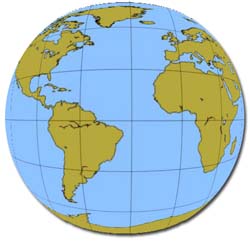| NOAA Magazine || NOAA Home Page |
NOAA RELEASES EXPANDED WORLD OCEAN DATABASE
 Oct.
31, 2006 � NOAA today announced that
it has released the significantly expanded World
Ocean Database 2005, the world's largest collection of scientific
information about the oceans of the globe, dating as far back as 1800.
(Click NOAA image for larger view of world’s oceans. Please
credit “NOAA.”)
Oct.
31, 2006 � NOAA today announced that
it has released the significantly expanded World
Ocean Database 2005, the world's largest collection of scientific
information about the oceans of the globe, dating as far back as 1800.
(Click NOAA image for larger view of world’s oceans. Please
credit “NOAA.”)
The new 2005 database, which has an additional 900,000 temperature profiles not available in the previous database issued in 2001, captures 29 different categories of scientific information from the oceans, including temperature, salinity, oxygen level and nutrient content.
The 2005 database also includes information about tritium, freons, noble gases and isotopes found in the oceans. The database, compiled by the Ocean Climate Laboratory, part of the NOAA National Oceanographic Data Center, is available online. NODC is part of the NOAA Satellite and Information Service.
"Having such detailed and extensive data about the world's oceans is a major key to understanding how the oceans are changing, and how this change impacts the overall atmosphere above," said Zdenka Willis, director of NODC. "The database also is a crucial part of the Integrated Ocean Observing System and the Global Earth Observation System of Systems, or GEOSS, as a reliable source of oceanic information."
In 2007 NOAA, an agency of the U.S. Commerce Department, celebrates 200 years of science and service to the nation. Starting with the establishment of the U.S. Coast and Geodetic Survey in 1807 by Thomas Jefferson much of America's scientific heritage is rooted in NOAA. The agency is dedicated to enhancing economic security and national safety through the prediction and research of weather and climate-related events and information service delivery for transportation, and by providing environmental stewardship of the nation's coastal and marine resources. Through the emerging Global Earth Observation System of Systems (GEOSS), NOAA is working with its federal partners, more than 60 countries and the European Commission to develop a global monitoring network that is as integrated as the planet it observes, predicts and protects.
Relevant Web Sites
NOAA World Ocean
Database 2005
NOAA National Oceanographic Data Center
Media
Contact:
John Leslie, NOAA
Satellite and Information Service, (301) 713-1265